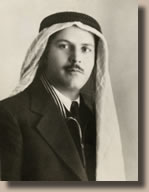APPENDIX 8
ABDELQADER AL-HUSSEINI
Abdelaqader Al-Husseini (Abou Moussa) (1908-1948), son of Palestine's first leader Moussa Kazem Pasha Al-Husseini, was the most widely known Palestinian resistance commander during the various phases of the Palestinians’ struggle, first against British Military forces occupying Palestine, then against the armed Jewish settlers brought by the British from Europe.
He fought during the Palestinian Great Revolt of 1936-39 and organized resistance from the mountains around the city of Jerusalem. He was seriously wounded in battle in 1939 and went to Iraq to seek medical attention. He eventually joined the revolt of the Iraqi nationalist Rashid Aaali Al-Kilani (Aaali not Ali), and fought in 1941 with the Iraqis against British forces in Iraq. He was captured by the British and detained for about two years, while his wife, Wajiha Al-Husseini, was put under house arrest in Baghdad. He was released in 1943 following the interference of King Abdelaziz Ibn Saud of Saudi Arabia. After a brief stay in Saudi Arabia, he went to Egypt in early 1946. In order for him to continue to defend his homeland Palestine, he and his wife sold whatever land and real estate they owned in order to buy weapons and ammunition.
His attempts at obtaining weapons and ammunition for the Palestinian fighters in Palestine through the newly created Arab League in Cairo failed. This did not prevent him though from returning to Palestine secretly to dodge the British who were after him, and succeeded in reaching Jerusalem after the Palestine Partition Plan in 1947 was made public. He led a desperate attempt at defending the city, but he was killed in a successful Jewish counter attack on 7 April 1948 at the village of Qastal, west of Jerusalem, and was buried within the campus of Al-Aqsa Mosque. His funeral was attended by thousands in Palestine, and equal numbers marched in solidarity through the streets of most other Arab and Muslim countries. If one were to compare him with other daring, dedicated and charismatic youthful guerilla leaders in modern history, Abdelqader Al-Husseini would be the “Che Guevara” of the Palestinians par excellence.
Abdelqader and Wajiha had one daughter, Haifa’, and three sons: Moussa, Faysal and Ghazi. The Eltahers and Abdelqader’s family, men, women and children, have always maintained a warm friendship through the years.
His son Faysal (or Faisal) was a long-time nationalist, political activist, and Director of Orient House in Jerusalem. He also served occasionally as Minister for Jerusalem Affairs in the Palestinian National Authority under Chairman Yasser Arafat following the Oslo Accords. Faysal died of a heart attack while attending a conference in Kuwait in June 2001. Had the Israelis been genuinely interested in a meaningful accommodation for both peoples during his life-time, and had the Palestinian leadership also risen to the occasion, Faysal Al-Husseini could have been the best partner and would have provided serious and effective leadership to achieve this elusive objective.
A DVD film entitled “O Jerusalem”, partially based on a book by the same name published in 1971 by Larry Collins and Dominique Lapierre, was released in Europe in October 2006 about the Battle of Qastal and the Battle involving the Jewish quarter in Jerusalem. The film partially portrays the roles played by Abdelqader Al-Husseini and Colonel Abdallah Al-Tal during those two battles respectively, which served as background for a story involving Palestinians and Jews.

